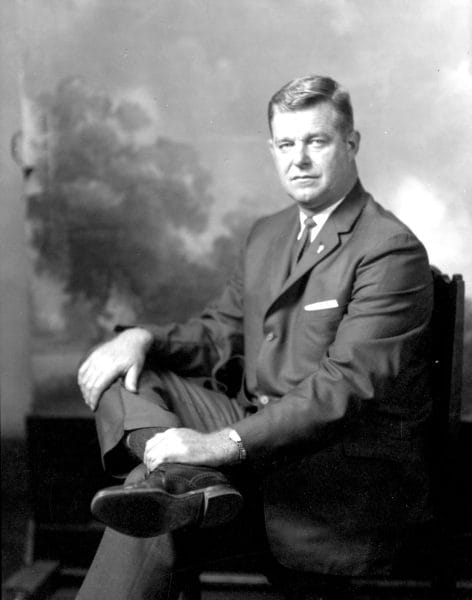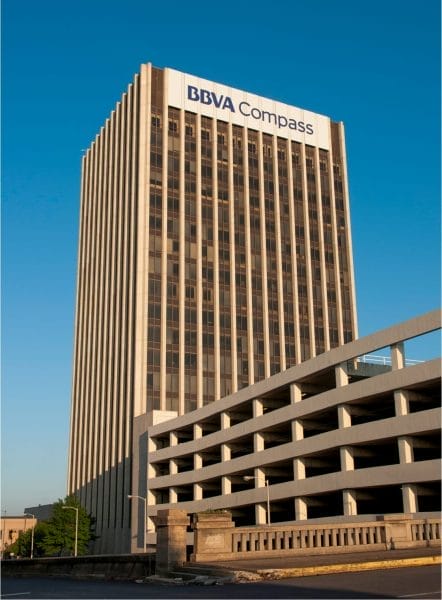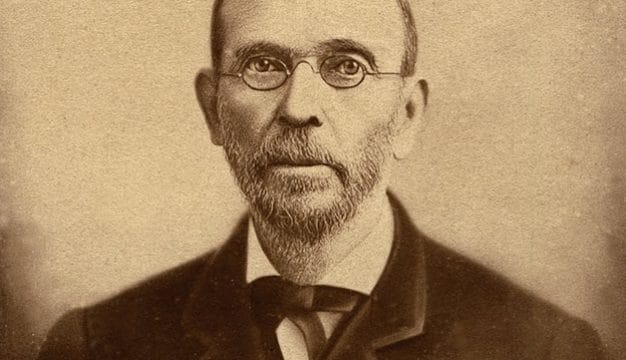BBVA Compass Bank
Founded as Compass Bank in Birmingham in the 1960s, BBVA Compass is an Alabama-based banking organization with current headquarters in Birmingham, Jefferson County. Compass Bank’s parent company, Compass Bancshares Inc., was acquired by Banco Bilbao Vizcaya Argentaria (BBVA) in 2007. The bank’s name was then changed to BBVA Compass Bank. BBVA is a global financial services firm based in Spain with operations in more than 30 countries throughout the world and, as of January 2012, ranked 30th in the world in terms of the total value of its stock. BBVA Compass operations are primarily based in Alabama, Arizona, Colorado, Florida, New Mexico, and Texas. In 2012, the organization managed more than 745 branches and more than 13,000 employees throughout its U.S. market area. BBVA Compass Bank is a state-chartered bank and a member of the Federal Reserve System.
 Harry Brock Jr.
Compass Bank was established in Birmingham in 1964 as Central Bank and Trust Company by a group led by financier Harry M. Brock Jr. Central was one of the early innovators of new banking practices, including all-day banking and Saturday banking hours, and even promoted S&H Green Stamps given to people receiving automobile loans. In 1971, Central Bank attempted a hostile takeover of State National Bank in Decatur, which at that time was the only bank in Alabama allowed to open branches across county lines. A protracted legal battle ensued as other Alabama banks filed objections to the takeover. Central ultimately prevailed and acquired State National Bank, renaming the holding company as the Central and State National Corporation. Shortly thereafter, the owners established a new joint entity called Central Bancshares of the South. In 1980, Brock led the push for a state law that allowed statewide banking in Alabama. At that time, banks were not generally allowed to open branches across county lines, making expansion very difficult. In 1981, Alabama law was changed to allow some expansion, and further changes in the law continued over the next several years that allowed full statewide and then regional expansions. In 1987, Central Bancshares moved into the Texas banking market with its acquisition of the failed First National Bank of Crosby, thus marking the beginning of the move toward interstate banking and the creation of the Southeast Compact, an agreement among the southern states that allowed banks to expand outside their respective state borders within the region. After the Texas acquisition, Central Bank and Trust changed its name to Compass Bank.
Harry Brock Jr.
Compass Bank was established in Birmingham in 1964 as Central Bank and Trust Company by a group led by financier Harry M. Brock Jr. Central was one of the early innovators of new banking practices, including all-day banking and Saturday banking hours, and even promoted S&H Green Stamps given to people receiving automobile loans. In 1971, Central Bank attempted a hostile takeover of State National Bank in Decatur, which at that time was the only bank in Alabama allowed to open branches across county lines. A protracted legal battle ensued as other Alabama banks filed objections to the takeover. Central ultimately prevailed and acquired State National Bank, renaming the holding company as the Central and State National Corporation. Shortly thereafter, the owners established a new joint entity called Central Bancshares of the South. In 1980, Brock led the push for a state law that allowed statewide banking in Alabama. At that time, banks were not generally allowed to open branches across county lines, making expansion very difficult. In 1981, Alabama law was changed to allow some expansion, and further changes in the law continued over the next several years that allowed full statewide and then regional expansions. In 1987, Central Bancshares moved into the Texas banking market with its acquisition of the failed First National Bank of Crosby, thus marking the beginning of the move toward interstate banking and the creation of the Southeast Compact, an agreement among the southern states that allowed banks to expand outside their respective state borders within the region. After the Texas acquisition, Central Bank and Trust changed its name to Compass Bank.
Upon Brock’s retirement in 1991, D. Paul Jones Jr. assumed the role of Chief Executive Officer (CEO) and in 1993 changed the name of Central Bancshares to Compass Bancshares. During Jones’s tenure as CEO, the bank continued expansion into Sunbelt markets with further acquisitions in Florida and Texas. In 1995, dissatisfied shareholders began to push Jones to take the organization in a different direction and take advantage of a purchase offer by First Union Bank, based at that time in North Carolina, because they believed the move would bring greater value to existing shares and provide greater opportunities to expand. Led by the founder and former CEO Harry Brock, the group launched a failed effort to convince other shareholders to vote out the current directors and then sell the organization. Having fended off the sale effort, Jones continued the bank’s western expansion with acquisitions of institutions in Arizona, Colorado, and New Mexico.
 BBVA Compass Bank
Jones retired in 2007 and was succeeded by Gary Hegel, who had previously served as Compass Bancshare’s Chief Financial Officer. After taking the helm, he was soon involved in the sale of Compass to BBVA for $9.6 billion. This acquisition represented a major change, as the ownership became international in scope, but did not entail any significant changes to customers of the bank except for the new name on signs. There were no significant job losses or branch closures as a result of the acquisition. The U.S. headquarters of the newly organized BBVA Compass Bancshares Inc. remained in Birmingham and Compass Bank branches retained that name. In late 2008, Gary Hegel retired, and Manolo Sanchez assumed the role of CEO. Sanchez had previously served in several positions with BBVA throughout the world and was president and CEO of Laredo National Bank in Texas immediately prior to joining BBVA Compass.
BBVA Compass Bank
Jones retired in 2007 and was succeeded by Gary Hegel, who had previously served as Compass Bancshare’s Chief Financial Officer. After taking the helm, he was soon involved in the sale of Compass to BBVA for $9.6 billion. This acquisition represented a major change, as the ownership became international in scope, but did not entail any significant changes to customers of the bank except for the new name on signs. There were no significant job losses or branch closures as a result of the acquisition. The U.S. headquarters of the newly organized BBVA Compass Bancshares Inc. remained in Birmingham and Compass Bank branches retained that name. In late 2008, Gary Hegel retired, and Manolo Sanchez assumed the role of CEO. Sanchez had previously served in several positions with BBVA throughout the world and was president and CEO of Laredo National Bank in Texas immediately prior to joining BBVA Compass.
BBVA Compass survived unscathed the financial crisis that began in late 2007. Whereas many U.S. financial institutions required government assistance through the Troubled Asset Relief Program (TARP), Compass, as a foreign-owned institution, was not eligible. However, like most financial institutions, BBVA Compass did respond to the crisis by cutting expenses with layoffs of around 10 percent of their workforce in 2009. One major advantage of BBVA Compass is its global diversification. The U.S. part of the organization accounts for only 10 percent of the total revenue of BBVA. Currently, BBVA Compass has branches in seven states throughout the South and Southwest. Total assets exceed $65 billion and deposits exceed $48 billion. BBVA Compass is among the 20 largest U.S. banks in terms of market share of deposits. BBVA Compass supports a variety of charitable causes through the BBVA Compass Foundation.
Further Reading
- Curtis, Wayne C. Establishing and Preserving Confidence: The Role of Banking in Alabama 1816-1994. Montgomery: Alabama Bankers Association, 1994.



